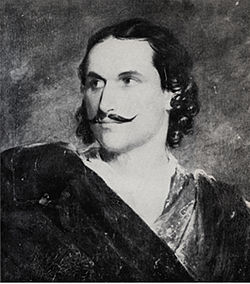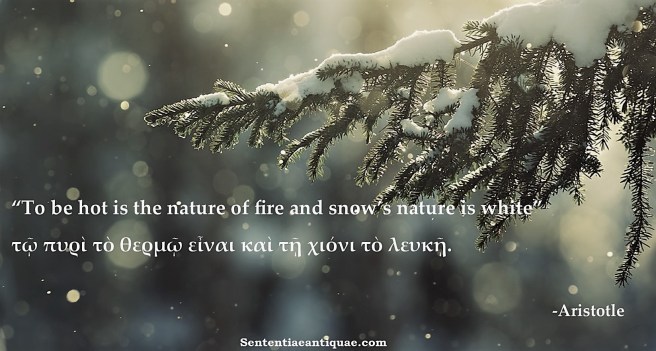N.B. This selection is by no means exhaustive.
Xenophanes, fr. D34
“Xenophanes [says eclipses] come from flames going out and that a different one happens again in the east. He reports in addition that there was an eclipse for an entire month and also a total eclipse that made the day seem like night.”
D34 (A41) Aët. 2.24.4 (Ps.-Plut.) [περὶ ἐκλείψεως ἡλίου]
Ξενοφάνης κατὰ σβέσιν· ἕτερον δὲ πάλιν πρὸς ταῖς ἀνατολαῖς γίνεσθαι· παριστόρηκε δὲ καὶ ἔκλειψιν ἡλίου ἐφ᾽ ὅλον μῆνα καὶ πάλιν ἔκλειψιν ἐντελῆ, ὥστε τὴν ἡμέραν νύκτα φανῆναι.
Xenophanes fr. D35
“Xenophanes says that there are many suns and moons arrayed along the earth’s latitudes, segments and zones. At certain times, he says, the disk falls out of the sky to some uninhabited place of the earth and an eclipse appears because it left empty space.”
D35 =(Stob.; cf. Ps.-Plut.) [περὶ ἐκλείψεως ἡλίου]
Ξενοφάνης· πολλοὺς εἶναι ἡλίους καὶ σελήνας κατὰ τὰ κλίματα τῆς γῆς καὶ ἀποτομὰς καὶ ζώνας. κατὰ δέ τινα καιρὸν ἐκπίπτειν τὸν δίσκον εἴς τινα ἀποτομὴν τῆς γῆς οὐκ οἰκουμένην ὑφ’ ἡμῶν καὶ οὕτως ὡσπερεὶ κενεμβατοῦντα ἔκλειψιν ὑποφαίνειν [. . . = D31].
Anaximander, Fr. 26
“Anaximander says that the [moon] is a wheel nineteen times larger than the earth, like the wheel of a chariot it has a hollow rim filled with fire similar to that of the sun, situated at an angle, like that one. It has a single exhalation point like the mouth of bellows. An eclipse happens when the wheel turns.”
Aët. 2.25.1 (Stob., cf. Ps.-Plut.)
Ἀναξίμανδρος κύκλον εἶναι ἐννεακαιδεκαπλασίονα τῆς γῆς, ὅμοιον ἁρματείῳ τροχῷ κοίλην ἔχοντι τὴν ἁψῖδα καὶ πυρὸς πλήρη καθάπερ τὸν τοῦ ἡλίου, κείμενον λοξόν, ὡς κἀκεῖνον, ἔχοντα μίαν ἐκπνοὴν οἷον πρηστῆρος αὐλόν. ἐκλείπειν δὲ κατὰ τὰς ἐπιστροφὰς τοῦ τροχοῦ.
Heraclitus Fr. 20 (=Stob)
“Herakleitos and Hekateios say that the sun is a burning specter from the sea and that it is bowl-shaped and curved on one-side. They say an eclipse happens because of the turn of the bowl shape so that the hollow side turns up and the curved side turns down to our vision.”
῾Ηράκλειτος καὶ ῾Εκαταῖος ἄναμμα νοερὸν τὸ ἐκ θαλάττης εἶναι τὸν ἥλιον. —Σκαφοειδῆ δ’ εἶναι, ὑπόκυρτον. —Γίνεσθαι δὲ τὴν ἔκλειψιν κατὰ τὴν τοῦ σκαφοειδοῦς στροφήν, ὥστε τὸ μὲν κοῖλον ἄνω γίγνεσθαι, τὸ δὲ κυρτὸν κάτω πρὸς τὴν ἡμετέραν ὄψιν.
Empedocles, Fr. D133
“Empedocles says that an eclipse happens when the moon moves under the sun”
D133 = Aët. 2.24.7 (Stob.) [περὶ ἐκλείψεως ἡλίου]
ἔκλειψιν δὲ γίνεσθαι σελήνης αὐτὸν ὑπερχομένης.
Antiphon fr. D21 and D24
“Antiphon says that [the sun] is made of fire that feeds on the wet mist around the earth and that its rising and setting come from it leaving air that has been consumed as it attaches to air with moisture.”
᾿Αντιφῶν πῦρ ἐπινεμόμενον μὲν τὸν περὶ τὴν γῆν ὑγρὸν ἀέρα, ἀνατολὰς δὲ καὶ δύσεις ποιούμενον, τῷ τὸν μὲν ἐπικαιόμενον αἰεὶ προλείπειν, τοῦ δ’ ὑπονοτιζομένου πάλιν ἀντέχεσθαι.
“And Antiphon says [lunar eclipses] happen because of the turn of the bowl-like celestial body and its angles.”
Ἀντιφῶν κατὰ τὴν τοῦ σκαφοειδοῦς στροφὴν καὶ τὰς περικλίσεις
Anaxagoras, fr. D4.7
“Anaxagoras says that the moon eclipses when the earth is in the way and sometimes because of the celestial bodies below the moon; the sun eclipses because the moon gets in the way during its new phase.”
D4 (< A42) Ps.-Hippolytus, Refutation of All Heresies
ἐκλείπειν δὲ τὴν σελήνην γῆς ἀντιφραττούσης, ἐνίοτε δὲ καὶ τῶν ὑποκάτω τῆς σελήνης, τὸν δὲ ἥλιον ταῖς νουμηνίαις σελήνης ἀντιφραττούσης.
Aristotle, Posterior Analytics, II 90a (On Lunar Eclipses)
“What is an eclipse? The stealing of light from the moon by the superposition of the earth. Saying “what is an eclipse” is the same thing as saying “why does the moon eclipse”. Because the light of the sun leaves it when the earth gets in the way.”
τί ἐστιν ἔκλειψις; στέρησις φωτὸς ἀπὸ σελήνης ὑπὸ γῆς ἀντιφράξεως. διὰ τί ἔστιν ἔκλειψις, ἢ διὰ τί ἐκλείπει ἡ σελήνη; διὰ τὸ ἀπολείπειν τὸ φῶς ἀντιφραττούσης τῆς γῆς.
Seneca the Younger, Natural Questions 7
“The sun has no audience unless it starts to disappear. No one looks at the moon unless it is eclipsing. Then, cities scream together and everyone makes a ruckus because of silly superstition.”
Sol spectatorem, nisi deficit, non habet. Nemo observat lunam nisi laborantem; tunc urbes conclamant, tunc pro se quisque superstitione vana strepitat.













